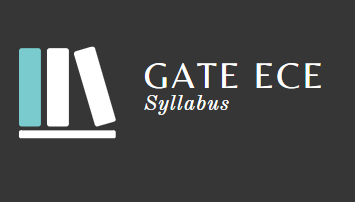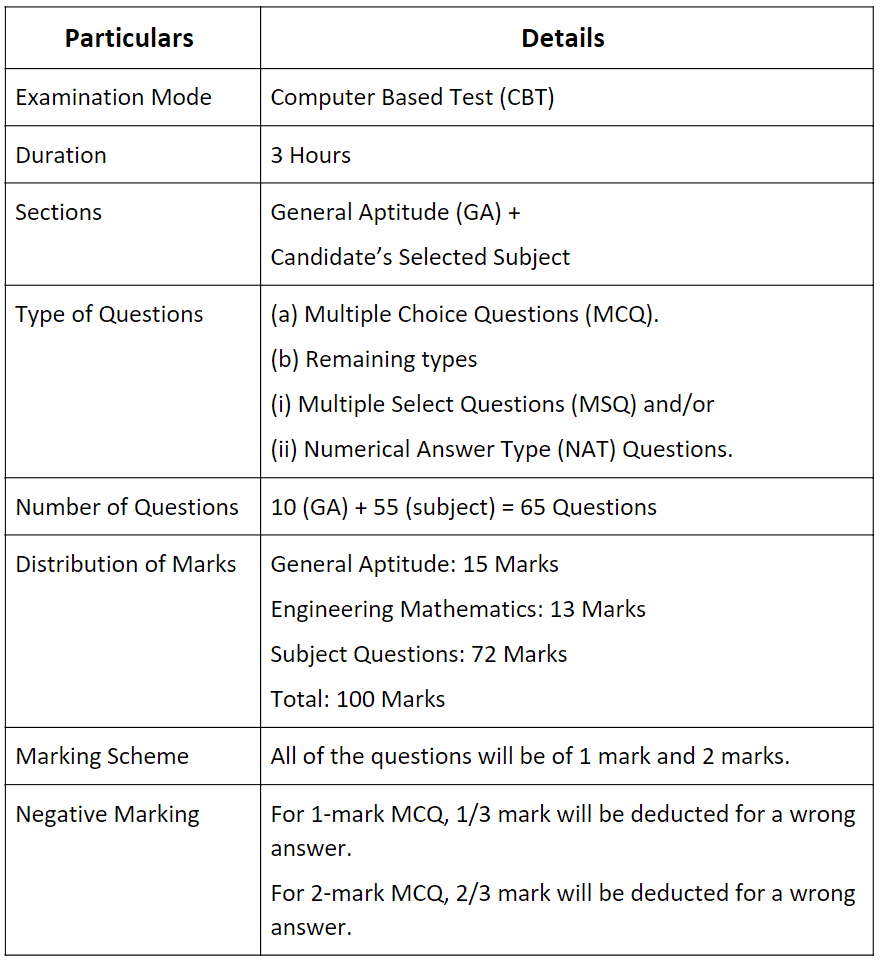Syllabus: Electronics and Communication Engineering (ECE), GATE 2026 | GATE ECE (Electronics) Mock Test Series 2026 PDF Download
| Table of contents |

|
| Introduction About GATE ECE 2026 |

|
| Topics & Sub-topics Covered |

|
| Syllabus for General Aptitude (GA) (Common to all Papers) |

|
| Electronics and Communication |

|
Introduction About GATE ECE 2026

- Graduate Aptitude Test in Engineering (GATE) is a national-level postgraduate entrance exam for engineering graduates, conducted by the Indian Institute of Science, Bangalore, or one of the seven IITs.
- GATE 2026 is expected to take place in February 2026, following the annual schedule.
- The organizing institute for GATE 2026 will be announced, and it will oversee the exam process and release official details.
- The Graduate Aptitude Test in Engineering (GATE) 2025 was conducted by the Indian Institute of Technology (IIT) Roorkee.
- The exam took place on February 1, 2, 15, and 16, 2025, covering 30 test papers.
- IIT Roorkee released the syllabus, managed registrations, and oversaw the entire examination process.
- Syllabus for GATE Electronics and Communication Engineering (ECE) 2026 will be released by the organizing institute, guiding candidates in their preparation.
Topics & Sub-topics Covered
Here is the list of topics and sub-topics for each subject that needs to be covered for the GATE 2026 Electronics & Communication Engineering Exam. Make sure the candidates get to know the following sections:- Engineering Mathematics
- Networks, Signals and Systems
- Electronic Devices
- Analog Circuits
- Digital Circuits
- Control Systems
- Communications
- Electromagnetics
Candidates preparing for the GATE 2026 Electronics and Communication Engineering Exam should review the syllabus provided below before beginning their preparation.
Before diving into the details of the GATE 2026 Electronics and Communication Engineering Syllabus, let’s take a look at an overview of the GATE 2026 Exam Pattern for Electronics and Communication Engineering.
Table: Exam Details
The three sections of the GATE ECE paper are:
(i) General Aptitude
(ii) Engineering Mathematics
(iii) Subject-Specific Section
Syllabus for General Aptitude (GA) (Common to all Papers)
1. Verbal Aptitude
- Basic English grammar: tenses, articles, adjectives, prepositions, conjunctions, verb-noun agreement, and other parts of speech.
- Basic vocabulary: words, idioms, and phrases in context.
- Reading Comprehension
- Narrative Sequencing
2. Quantitative Aptitude
- Data interpretation: data graphs (bar graphs, pie charts, and other graphs representing data), 2- and 3-dimensional plots, maps, and tables.
- Numerical computation and estimation: ratios, percentages, powers, exponents and logarithms, permutations and combinations, and series.
- Mensuration and Geometry
- Elementary Statistics and Probability
3. Analytical Aptitude
4. Spatial Aptitude
(a) Transformation of shapes:
- Translation
- Rotation
- Scaling
- Mirroring
- Assembling
- Grouping
(b) Paper folding
(c) Cutting
(d) Patterns in 2 and 3 dimensions.
Electronics and Communication
Section 1: Engineering Mathematics
- Linear Algebra: Vector space, basis, linear dependence and independence, matrix algebra, eigen values and eigen vectors, rank, solution of linear equations - existence and uniqueness.
- Calculus: Mean value theorems, theorems of integral calculus, evaluation of definite and improper integrals, partial derivatives, maxima and minima, multiple integrals, line, surface and volume integrals, Taylor series.
- Differential Equations: First order equations (linear and nonlinear), higher order linear differential equations, Cauchy's and Euler's equations, methods of solution using variation of parameters, complementary function and particular integral, partial differential equations, variable separable method, initial and boundary value problems.
- Vector Analysis: Vectors in plane and space, vector operations, gradient, divergence and curl, Gauss's, Green's and Stokes' theorems.
- Complex Analysis: Analytic functions, Cauchy's integral theorem, Cauchy's integral formula, sequences, series, convergence tests, Taylor and Laurent series, residue theorem.
- Probability and Statistics: Mean, median, mode, standard deviation, combinatorial probability, probability distributions, binomial distribution, Poisson distribution, exponential distribution, normal distribution, joint and conditional probability.
You can prepare Engineering Mathematics for GATE through EduRev’s Engineering Mathematics Course covering all the topics along with tests.
Section 2: Networks & Signals and Systems
- Circuit Analysis: Node and mesh analysis, superposition, Thevenin's theorem, Norton's theorem, reciprocity. Sinusoidal steady state analysis: phasors, complex power, maximum power transfer. Time and frequency domain analysis of linear circuits: RL, RC and RLC circuits, solution of network equations using Laplace transform.
- Linear 2-port network parameters, wye-delta transformation.
- Continuous-time Signals: Fourier series and Fourier transform, sampling theorem and applications.
- Discrete-time Signals: DTFT, DFT, z-transform, discrete-time processing of continuous-time signals.
- LTI Systems: definition and properties, causality, stability, impulse response, convolution, poles and zeroes, frequency response, group delay, phase delay.
Section 3: Electronic Devices
- Energy bands in intrinsic and extrinsic semiconductors, equilibrium carrier concentration, direct and indirect band-gap semiconductors.
- Carrier Transport: Diffusion current, drift current, mobility and resistivity, generation and recombination of carriers, Poisson and continuity equations.
- P-N junction, Zener diode, BJT, MOS capacitor, MOSFET, LED, photodiode, and solar cell.
Section 4: Analog Circuits
- Diode Circuits: Clipping, clamping and rectifiers.
- BJT and MOSFET Amplifiers: Biasing, AC coupling, small signal analysis, frequency response. Current mirrors and differential amplifiers.
- Op-amp Circuits: Amplifiers, summers, differentiators, integrators, active filters, Schmitt triggers and oscillators.
Section 5: Digital Circuits
- Number Representations: Binary, integer and floating-point- numbers.
- Combinatorial Circuits: Boolean algebra, minimization of functions using Boolean identities and Karnaugh map, logic gates and their static CMOS implementations, arithmetic circuits, code converters, multiplexers, decoders.
- Sequential Circuits: Latches and flip-flops, counters, shift-registers, finite state machines, propagation delay, setup and hold time, critical path delay.
- Data Converters: Sample and hold circuits, ADCs and DACs.
- Semiconductor Memories: ROM, SRAM, DRAM.
- Computer Organization: Machine instructions and addressing modes, ALU, data-path and control unit, instruction pipelining.
Section 6: Control Systems
- Basic of Control System & Transfer Function: Mathematical modeling and representation of systems, Feedback principle, transfer function.
- Block Diagram & Signal Flow Graphs.Time Response Analysis: Transient and Steady‐state analysis of linear time-invariant systems.
- Frequency Domain Analysis: Stability analysis using Routh-Hurwitz, and Nyquist criteria, Bode plots, root loci.
- Controller & Compensators: P, PI, and PID controllers, Lag, Lead and Lead‐Lag compensators.
- State Space Analysis: State-space model, Solution of state equations of LTI systems, R.M.S. value, average value calculation for any general periodic waveform.
Section 7: Communications
- Random Processes: Auto correlation and power spectral density, properties of white noise, filtering of random signals through LTI systems.
- Analog Communications: Amplitude modulation and demodulation, angle modulation and demodulation, spectra of AM and FM, superheterodyne receivers.
- Information Theory: Entropy, mutual information and channel capacity theorem.
- Digital Communications: PCM, DPCM, digital modulation schemes (ASK, PSK, FSK, QAM), bandwidth, inter-symbol interference, MAP, ML detection, matched filter receiver, SNR and BER. Fundamentals of error correction, Hamming codes, CRC.
Section 8: Electromagnetics
- Maxwell's Equations: Differential and integral forms and their interpretation, boundary conditions, wave equation, Poynting vector.
- Plane Waves and Properties: Reflection and refraction, polarization, phase and group velocity, propagation through various media, skin depth.
- Transmission Lines: Equations, characteristic impedance, impedance matching, impedance transformation, S-parameters, Smith chart.
- Rectangular and circular waveguides, light propagation in optical fibers, dipole and monopole antennas, linear antenna arrays.
This is the overall section of your GATE Electronics and Communication Engineering syllabus—your roadmap to success! Dive in with confidence, embrace the challenge, and let your dedication shine. Every topic is a step toward mastering your dreams, so learn well and stay motivated—your hard work will pay off!

Feel free to study with EduRev, where we’re here for you with all the resources you need—comprehensive notes, practice tests, and expert guidance. You’ve got this, and we’re your biggest cheerleaders every step of the way. Keep pushing, stay inspired, and let’s conquer GATE together!
All the Best ..!
|
26 docs|263 tests
|
FAQs on Syllabus: Electronics and Communication Engineering (ECE), GATE 2026 - GATE ECE (Electronics) Mock Test Series 2026
| 1. What is the GATE exam and who conducts it? |  |
| 2. What are the main topics covered in the GATE ECE syllabus? |  |
| 3. Is there a specific syllabus for General Aptitude (GA) in GATE? |  |
| 4. How can I prepare effectively for the GATE ECE exam? |  |
| 5. What is the significance of GATE scores for ECE graduates? |  |
















